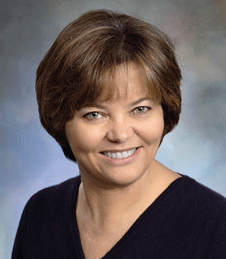
Professor Helen Heslop.
Escaping the Houston heat just in time for an Otago cold snap, distinguished Otago alumna Professor Helen Heslop recently spent a few days in Dunedin as the John Borrie Professorial Fellow.
She gave a public lecture and talks at the University about the ground-breaking clinical trials she has conducted during her career.
A professor at the Baylor College of Medicine in Houston, Texas, Professor Heslop is a world leader in using cell therapy to treat cancer and infectious diseases.
Growing up in Dunedin and attending Kaikorai Valley High School (now Kaikorai Valley College), Professor Heslop went on to study medicine at Otago, completing her clinical years in Christchurch.
“I got a really good education here, which in some ways you only find out in retrospect,” she says. “I had a lot of good teachers and in Christchurch gained very good clinical experience.”
Her early career influences include Professor Sandy Smith from microbiology, Dr Michael Beard in haematology in Christchurch, and many “entertaining” demonstrators, including Professor Jim Shaw.
"I had a lot of good teachers and in Christchurch gained very good clinical experience."
Professor Heslop did haematology as a house surgeon, and went down that route for her clinical training. She graduated MB ChB in 1980 and in 1985, encouraged by her mentors in Christchurch, left New Zealand to join the Royal Free Hospital in London, where she undertook transplantation immunology research that earned her a Doctor of Medicine degree from Otago in 1990.
At that stage, she felt she needed to gain some experience in the US, and left a cold English winter to take up a position at St Jude's Children's Research Hospital in Memphis.
In 1997 she moved to Baylor College, where she is currently a Professor of Medicine and Paediatrics and Director of the Centre for Cell and Gene Therapy.
During her career, her research has focussed on developing targeted cell therapies that have less toxicity than treatment such as radiotherapy and chemotherapy. She has also pursued therapies to restore anti-viral immunity in patients following bone marrow transplants.
“I started translational research because I found it interesting going between the lab and the patient – to be able to take cells from a patient and manipulate them and take them back. It's a nice connection going between the clinic and the laboratory to try and improve patient outcomes.”
She is now extending her research to include a greater range of cancers and is working towards cell therapies being more broadly applicable and accessible to patients.
“The idea is to make an 'off-the-shelf' product rather than help just one patient.”
"The idea is to make an 'off-the-shelf' product rather than help just one patient."
As well as her own work, Professor Heslop enjoys mentoring and providing guidance to people in their careers. She has received a number of international awards including a Doris Duke Distinguished Clinical Scientist Award in 2000 and the Dr Kenneth B McRedie Medical Honoree Award which recognises significant and substantial contributions to the field of blood-related cancers. In 2013 she received an Honorary Doctor of Science degree from Otago.
Continuing her connections with Otago, Professor Heslop is on the board of Alumni of the University of Otago in America (AUOA). With her sister Hilary, a food specialist, she also set up the Barbara and John Heslop Memorial Fund at Otago, in the name of their parents. The fund supports an endowment of $300,000 for research in the disciplines of pathology or immunology within the Otago Medical School.
Barbara and John Heslop were both long-time Otago faculty members who made major contributions not only to medical research and clinical practice but also to undergraduate and postgraduate education through their involvement with the Dunedin Basic Medical Sciences Course.